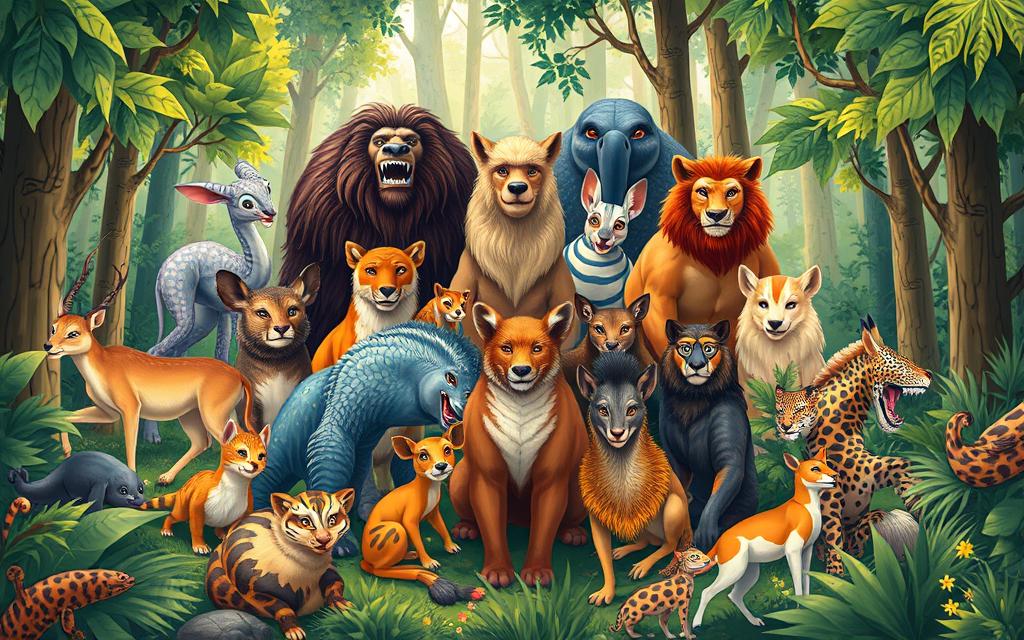Did you know that evolutionary psychologist Eric R. Pianka says humans have instincts that were once helpful but now harm us? These include instincts for denial, revenge, loyalty, greed, and wanting to have children. These instincts helped our ancestors survive and have children, but they don’t help us much today.
Pianka believes that if we don’t control these instincts, society could collapse. Understanding our instincts is key to controlling our natural impulses. Our gut feelings and fight-or-flight response affect our lives more than we realize.
This article will look at how our instincts, natural tendencies, and quick decisions can both help and hurt us today. By understanding where these instincts come from, we can use them for good and avoid their negative effects.
The Power of Innate Behaviors
Our instincts have deep roots in evolution, affecting our daily lives in big ways. We come from ancient cave dwellers, carrying a cave dweller mentality and prehistoric survival mechanisms with us. These instincts, shaped over thousands of years, still influence our lives today. They often do so in ways we don’t expect and that can be harmful.
Evolutionary Roots of Our Instincts
Take our fear of snakes, for example. Humans lived with dangerous snakes and learned to fear them. This fear saved our ancestors’ lives. We also have instincts for denial, loyalty to our group, and seeking revenge. These helped our ancestors deal with threats and survive in a tough world.
But in today’s modern world, these instincts can be harmful. Our brains still push us towards these primal impulses, even if they don’t help us now. As we face the challenges of a crowded, high-tech world, it’s key to understand our evolutionary roots. This can help us make better choices for the future.
“Our instincts, forged in the crucible of our evolutionary past, continue to shape our behavior in ways that are often at odds with the realities of the modern world.”
Instincts in Conflict with Modernity
Reflecting on our instincts and the modern world, I feel a mix of unease. The gap between our ancient behaviors and today’s life is both fascinating and troubling.
Our ancestors’ instincts, shaped over time, clash with today’s digital world. The greed that helped them survive now leads to vast wealth gaps. Tribal loyalty and desire for revenge fuel conflicts between groups, causing harm.
It’s like we’re using old tools for a new world. Our prehistoric behaviors in the digital age don’t match our current reality. This mismatch can lead to serious problems.
“The human brain is the product of millions of years of evolution, but the human-built world is the product of just a few thousand years of civilization. This evolutionary mismatch is the source of much of our modern malaise.”
I often think about how to balance our instincts with today’s world. We need to face the evolutionary mismatch and adapt our old behaviors for now.
| Prehistoric Instincts | Modern Manifestation |
|---|---|
| Greed | Institutionalized wealth inequality |
| Tribal Loyalty | Deadly conflicts between nations, political parties, and religions |
| Desire for Revenge | Escalating cycles of retribution and violence |
Understanding our instincts isn’t about judging them as good or bad. It’s about using their power in today’s world. This journey needs a deep look at our past and a readiness for future changes.
The Role of Denial and Avoidance
Exploring our human instincts reveals a troubling behavior: denial. This ability to ignore hard truths was once crucial for survival. Now, it hinders our progress, stopping us from tackling big issues.
Dangers of Denial in an Overpopulated World
Consider overpopulation. Our planet’s resources are under huge strain from too many people. Yet, talking about it is taboo. We avoid the truth, refusing to see the problems our growing numbers cause.
This denial as an instinct comes from our past, aiding survival. But now, it stops us from solving the problems overpopulation brings. We must face the truth about overpopulation and human denial to ensure a future for our children.
“The ability to deny unpleasant realities helped our ancestors cope with threats, but now we use denial to avoid confronting the serious issues facing humanity, such as overpopulation.”
We need to overcome denial to tackle today’s challenges. Facing our problems head-on is key to a better future. This way, we can live in balance with our planet.
Tribal Loyalty: A Double-Edged Sword
We’ve evolved a lot since our ancestors, but some instincts still guide us today. One key instinct is our tribal mentality. It makes us want to stick with our group and doubt outsiders.
This us vs. them mentality helped our ancestors stay safe by sticking together. But now, in our connected world, it can be dangerous. It leads to harmful nationalism, religious fanaticism, and political partisanship.
Our evolutionary basis of tribalism often makes groups fight instead of work together. This makes it hard to solve big problems like climate change and pandemics. Our in-group loyalty can even stop us from finding solutions we need.
| Tribal Mentality | Modern Implications |
|---|---|
| Protective in-group loyalty | Harmful nationalism and fanaticism |
| Survival through community | Divisive political partisanship |
| Defense against external threats | Obstacles to global cooperation |
In the 21st century, we must understand our evolutionary basis of tribal instincts. We need to move past them to progress and protect our future.
Revenge: An Outdated Instinct
In today’s world, where nuclear weapons can wipe out entire civilizations, the old human instinct for revenge is no longer smart or safe. We’ve moved past our Stone Age roots, but our urge for retaliation and escalation still endangers our survival.
Back when we lived in small groups, seeking revenge might have kept us safe. But now, with nuclear weapons, this old urge clashes with our modern tech. It’s a big mismatch.
Nuclear Age and the Futility of Revenge
Dr. Eric Pianka, a well-known ecologist, pointed out that “bashing” enemies isn’t effective anymore. With just a button, we can cause huge destruction. Our desire for revenge could destroy our civilization, showing how pointless it is today.
- The cycle of revenge and retaliation can lead to huge violence, risking our whole species.
- In the nuclear era, chasing revenge is a harmful urge we can’t keep acting on.
- We need to control our revenge and retaliation urges. The outcomes of our actions could be huge disasters.
“The idea of ‘bashing’ an enemy over the head no longer works when the push of a button can trigger nuclear annihilation.”
With the nuclear threat, our old revenge instinct is outdated and risky. We must move past it. The future of humans relies on us overcoming these basic urges. We need to find better ways to solve conflicts and create a peaceful, lasting world.
Greed: A Hardwired Survival Mechanism

Greed is an instinct from our past that has grown in today’s society. Our ancestors survived better if they could store and gather more resources. This drive to hoard and accumulate helped them survive and pass on their genes. Now, it’s a big part of the wealth inequality we see today.
The institutionalization of greed has made this instinct strong. It shows up in big companies controlling the market, a few people having most of the wealth, and using up limited resources. This behavior helped our ancestors but now threatens our modern world’s balance and future.
Consequences of Institutionalized Greed
This greed as an instinct has big and bad effects. With wealth and resources getting into fewer hands, the hoarding and resource scarcity that helped our ancestors now cause big problems. These issues lead to social and political problems, and break down the social ties that keep us together.
| Indicator | United States | Global Average |
|---|---|---|
| Wealth Gini Coefficient | 85.9 | 67.9 |
| Top 1% Wealth Share | 42.5% | 28.8% |
| Poverty Rate | 13.7% | 10.0% |
The data shows the big wealth inequality in the United States. The top few have much more wealth than the rest of the world. This imbalance hurts social unity and threatens our economy and politics.
“Greed, for lack of a better word, is good. Greed is right, greed works. Greed clarifies, cuts through, and captures the essence of the evolutionary spirit.”
– Gordon Gekko, “Wall Street” (1987)
We need to deal with the effects of institutionalized greed. We must balance our natural instincts with today’s needs. The solution is more empathy, working together, and sharing resources fairly. These values were once seen as weak, but now they’re crucial for our survival and success.
how our human instincts affect our lives
In today’s fast world, it’s easy to overlook the fact that our instincts guide us. These instincts, shaped over thousands of years, still deeply affect our feelings, beliefs, and even our daily choices.
Our instincts have a big role in modern life. They can make us loyal to our groups or driven by greed. These instincts often clash with our modern, tech-based world.
Knowing about these instincts is key. It helps us think more about how they influence our actions. By understanding evolutionary psychology and daily decision-making, we can balance our natural behaviors in a technological world with our modern thinking.
“The mind is not a vessel to be filled, but a fire to be kindled.” – Plutarch
Dealing with our instincts in modern life means we’re not just controlled by our urges. By being aware of our instincts and our history, we can use them to improve our lives. This way, we’re not just acted upon by them.
The mix of our hardwired behaviors in a technological world shows how adaptable and strong humans are. By blending our ancient instincts with today’s reality, we can create a future that honors both our primal and rational sides. This future will truly show off what makes us unique.
Rational vs. Irrational Thought Processes
We have a unique ability in our brains. Our rational thinking lets us understand the world clearly, using logic and reason. But, our emotional thoughts, which come from our past, often clash with this rational way.
This battle between our thinking and feelings, known as the dual-process theory of cognition, affects how we make choices and act. Our rational, left-brain thinking helps us deal with today’s complex life. But, our instinctive thinking, from the right side of our brain, can make us act on impulse and make irrational choices.
The Duality of Human Cognition
Consider this: we try to make smart, informed choices, but our tribal loyalty, desire for revenge, and deep-seated greed can mess with our judgment. This mix of rational and instinctive thinking is both a gift and a challenge. It pushes us to balance our rational and emotional thoughts.
- Rational thinking: Understanding the world through logic and reason
- Instinctive thinking: Emotional, deep-rooted thoughts that can clash with reason
- Dual-process theory of cognition: The mix of intellect and emotion in making decisions
As we face today’s challenges, it’s key to understand this rational vs. instinctive struggle. We should aim to make choices that match our higher, ethical selves. This way, we can use our amazing human thinking to its fullest.
“The right hemisphere of the brain exerts invisible control over the rational left hemisphere, leading to internal conflicts and impeding our ability to make fully informed, ethical decisions.”
Instincts and Group Identities

Our instincts shape our actions and how we connect with others. They make us loyal to those who share our background, like skin color, nationality, or culture. This loyalty helped our ancestors survive by keeping their groups strong.
Now, in our connected world, these instincts lead to division. This makes it hard to work together globally to solve our problems. Understanding why we favor our own group over others helps us see why we have conflicts and prejudices.
- Our instincts make us protect our own “tribe” strongly.
- The need to stick together in our groups comes from our ancestors’ fight for survival.
- Identifying with certain groups and seeing others as threats shapes who we are and how we make decisions.
“Tribalism is a strong force today, coming from our past. Knowing how our instincts guide our group identities is key to overcoming our divisions.”
As we face today’s challenges, it’s important to see how our instincts still affect our social ties and actions. By understanding these drives, we can try to move past them. This could help us come together to tackle our global issues.
Music and the Irrational Brain
Exploring the link between our instincts and the modern world, music’s role is striking. It connects deeply with our irrational mind. Studies show music lives in the right brain, linked to emotions and spirituality.
Music stirs deep feelings, making it a tool for leaders to boost patriotism, religious fervor, and loyalty. National anthems, religious hymns, and team fight songs stir our primal instincts. They make us loyal and ready for group conflicts and wars. This shows how our past can be used to control our rational thoughts.
Emotional Power of Music and Its Exploitation
Music’s emotional strength and its role in shaping our actions are well-known. From ancient Greeks to today’s marketers and politicians, music’s impact on our irrational mind is clear.
“Music, like religion, resides in the irrational right side of the brain, adjacent to the region associated with ‘spirituality.'”
Looking into music’s origins, we see it’s linked to our survival instincts. By understanding music’s role in our irrational emotions, we can manage our rational and irrational sides better in today’s world.
The Primal Urge to Procreate
The urge to have children is a key part of our drive to reproduce. It’s a strong instinct that has been with us for thousands of years. This drive helps keep our genes alive and our species going.
Men and women have different reasons for wanting to have children. Men often want to have sex and spread their genes. Women focus on making a safe place for their kids. These hardwired reproductive behaviors from the past still affect us today, sometimes making it hard to reach our goals.
Even though it seems basic, this drive is crucial for our survival. It has helped us grow as a species. It keeps our genes going and has shaped our society.
“The urge to procreate is one of the most powerful forces shaping human behavior, a testament to the enduring power of our evolutionary past.”
Understanding our deep desires is key in today’s complex world. We should try to use these instincts wisely, not ignore them. By balancing our instincts with our thoughts, we can learn more about being human. This can lead to a better future for everyone.
Conclusion
Exploring how our past affects our lives today, I feel both wonder and unease. Pianka’s research shows how deep our primal instincts run. These instincts, once helpful, now challenge our modern society.
Our natural urges, like seeking revenge or personal gain, don’t fit well with today’s world. To ensure a better future, we must learn to control these instincts. By using our brains to guide us, we can change our actions for the better.
Understanding our evolutionary history helps us manage our natural behaviors. This knowledge lets us live in harmony with modern society. I believe we can overcome our primal nature to build a better world for all.

